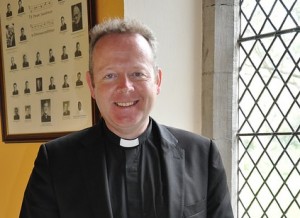
By Sarah Mac Donald - 28 May, 2016

Archbishop Eamon Martin has said he as has “no objection” to the idea of priests being allowed to marry but doesn’t see it as a quick fix solution to the vocations crisis.
In a frank and wide-ranging discussion with Hot Press magazine the Primate of All Ireland said the decline in vocations is a “major issue” for the bishops.
One of the ways they are dealing with the crisis is by “borrowing back from the Churches that the priests and sisters of Ireland served” by bringing priests in from elsewhere around the world where vocations are plentiful.
He suggested that the Church in Ireland needs a period of renewal and that renewal will take about thirty years to get over “a lot of the struggles and the immaturity that we have in our church”.
Asked about the importing of priests from overseas, the Archbishop responded, “We need to be courageous and creative in welcoming priests from abroad to help us over this period. It’s not forever. You think of America; for a long time in the 50s and 60s the American Church was served by Irish priests. Now it’s served by native priests from the US. The Irish Church helped out another part of the universal church that was in need. Now we are in need and we look to the universal church for assistance.”
On the issue of celibacy, the Archbishop said there are “great graces within celibacy” and that it’s a huge gift to the Church for a young man to give his life totally to the church or a young woman in the religious life”.
The archbishop admitted he’d dated a number of girlfriends before joining the seminary and thought he was in love a few times.
Even since becoming a priest, he has “met many women to whom I’m fairly sure I would be attracted and in another life might have considered, ‘Would I like to be married to this person? Have children with this person?’”
But he says he has made a commitment that he has to try to be faithful to and adds that he is no different to his friends who got married and have struggled with fidelity.
The interview also covers his reflections on the marriage referendum, homosexuality and his opposition to attempts to repeal the 8th Amendment.
On the thorny question of gay marriage, he says being “a homosexual person is not a sin” but adds that the Church believes the right place for sexual relations is within marriage between a man and a woman.
Archbishop Martin hitsout at the push for a repeal of the 8th amendment which he described as a “powerful expression of the equality of the right to life of all people” including the most vulnerable.
He indicated that the bishops will be more vocal in challenging efforts to repeal the amendment which he claims will lead to “life inequality” for the unborn child.
The leader of the Catholic Church on the island of Ireland also believes there should be a united Ireland and said in the interview that he would like to work to bring it about.
Describing himself as a nationalist he stressed that he never contemplated the use of violence as a means of achieving a united Ireland.
“I do believe that Ireland should be one. And I would like to work for that, and continue to work for that, by peaceful means and by persuasion, recognising that there are many people on this island who do not want that. At no point whatsoever would I have believed in the use of violence in order to achieve that,” he states.
Recalling life in Derry growing up during the Troubles, he said he was constantly searched on his way to school or the shops and that he also, as a 12 year old, came face to face with horrors such as the aftermath of a bomb attack in which a number of people lost their lives.
Referring to the debate on Brexit, the 54 year old prelate sees a united Europe as something positive rather than negative, as political borders are less important than a common humanity, common economic needs, and common social needs.
He suggest that this vision of a united Europe has meant that the border between Northern Ireland and the rest of Ireland has increasingly become less important. “I would like to see that trend continuing,” he comments.
The Catholic Church in Ireland is an All-Ireland church, like the Church of Ireland, the Presbyterian and the Methodist Churches.
Dr Martin explains that his own diocese of Armagh straddles the border, with 60% of its parishioners in Northern Ireland and 40% in the Republic. It has a political border and two currencies – “but we see ourselves as one,” he says.
Warning that peace can’t be taken for granted, the leader of the Catholic Church says there are “people who want to drag us back, who feel that you can still bomb people into a united Ireland. There are still people in our communities who think that the peace was a lie, and that it was too early to make peace.”
“I don’t agree. I think it was too late. I think far too many people lost their lives and far too many people were maimed and injured for life – and that’s only talking about the physical injuries, not to mention the psychological injuries.”